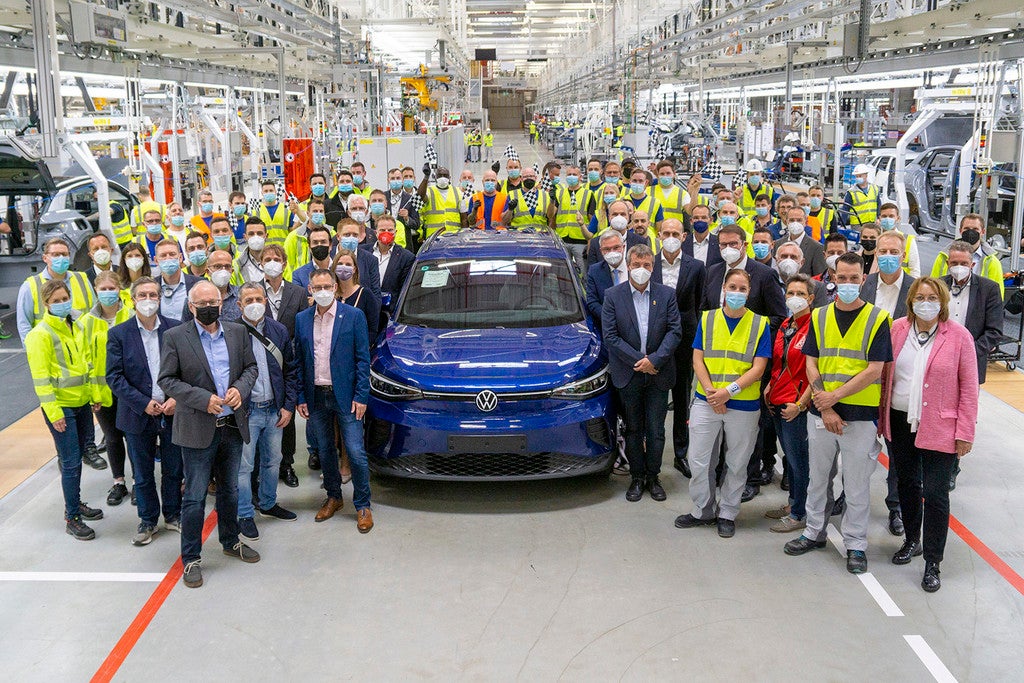
Volkswagen AG reportedly is considering unprecedented factory closures in Germany which could lead to a major battle with the country’s powerful unions which hold seats on supervisory boards.
Potential measures also include trying to end the company’s 30 year pact with workers to keep jobs secure, the company said, according to Bloomberg.

Discover B2B Marketing That Performs
Combine business intelligence and editorial excellence to reach engaged professionals across 36 leading media platforms.
The automaker’s main target was its underperforming Volkswagen Passenger Cars brand where profit margins are getting squeezed as the transition to EVs slows and consumers reduce spending.
Bloomberg noted any shutdowns would mark the first closures in Germany in the company’s 87 year history though it did close its US plant in Westmoreland, Pennsylvania, set up to produce a local version of the original Golf hatchback badged as the Rabbit.
“The economic environment has become even tougher and new players are pushing into Europe,” VW chief executive officer Oliver Blume said in a statement cited by Bloomberg.
“Germany as a business location is falling further behind in terms of competitiveness.”
Bloomberg also noted a major labour dispute would be a major test for Blume, who also heads Porsche, after union clashes felled a number of his VW predecessors.
Raising returns at the VW brand had become harder with higher logistics, energy and labour costs. Margin fell to 2.3% during the first half from 3.8% a year ago and Chinese sales are faltering with the EV model range far behind domestic competitors which are also growing sales in Europe.
VW recently announced a plan to produce low cost EVs ‘in Europe for Europe’ but the first models aren’t due out until 2027.
Workers are hard to sack in Germany. As Bloomberg noted, the looming clash at one of Germany’s biggest employers threatens a postwar consensus where workers hold significant sway. Decades old codetermination agreements are coming under pressure as new competitors target the market and populist political parties surge.
Weekend elections saw the Alternative for Germany party placed second in Saxony, where VW owns an EV making plant in Zwickau (once in the former East Germany and earlier home to the Audi and Horch brands) and win elections in neighbouring Thuringia.
“I am deeply concerned that the VW Group management is no longer ruling out plant closures and compulsory redundancies,” SPD lawmaker Bernd Westphal, economic policy spokesman for Scholz’s parliamentary group, told Bloomberg News.
“The SPD parliamentary group is firmly on the side of the employees and expects constructive talks” with the works councils and unions.
Bloomberg noted that, of the 650,000 people VW employs worldwide, almost 300,000 are in Germany. Half the seats on the company’s supervisory board are held by labour representatives, and the German state of Lower Saxony, which holds a 20% stake, often sides with trade union bodies.
The setup is part of a labyrinthine governance system where management must gain the billionaire Porsche-Piech family and labour side support for major decisions, Bloomberg added.
Works council head Daniela Cavallo said in a separate statement cited by Bloomberg VW’s management had warned VW Passenger Cars risks losing money and was considering closure of at least one larger car making factory and one component site in Germany, alongside abolishing wage agreements.
VW was also “questioning” the production of a compact electric SUV model at the main carmaking site in Wolfsburg from 2026, key to filling the factory’s capacity, the works council added. The Trinity model, currently planned for Zwickau in 2027, was at risk of being delayed.
Volkswagen has capacity for 14m vehicles but built only 9m in 2023, Bloomberg said.
“We expect the issue of factory closures will not arise due to the successful use of alternatives,” Bloomberg quoted Stephan Weil, Lower Saxony premier and VW supervisory board member, as saying. “The state government will pay particular attention to this.”
The Volkswagen brand has component production sites in Brunswick, Kassel, Salzgitter, Hannover and Chemnitz, as well as carmaking plants in Wolfsburg, Emden, Zwickau, Dresden, Osnabrueck and Hannover, the report noted.






